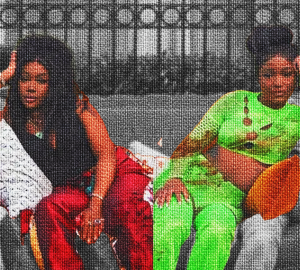
For the last three years, Atlanta has been battling one of its most controversial projects. Cop City has been at the center of local politics with no conclusion in sight. Despite the constant protests, extensive social media campaigns, and signatures showing just how unpopular this project is, the city is determined to go against its citizens’ wishes.
What is Cop City?
If you are unfamiliar with this project being built in our backyard, Cop City could become the largest police training facility in the country. DeKalb County has set aside around 150 acres of land in the Weelaunee Forest for this $110 million project, which has skyrocketed over the past few years. The plan includes military-grade training facilities, a mock city to practice “urban warfare,” shooting ranges, and a Black Hawk helicopter landing pad. It sits near a watershed with primarily Black residents who overwhelmingly oppose the project. This facility highlights the established combative dynamic between the Atlanta police department and the citizens it’s meant to serve.
The land that Cop City is being built on has had a long, dark history. This forest was originally occupied by the Muscogee people who were forced out of their homes nearly 200 years ago. This land that already symbolized the displacement of indigenous people now continues that antagonistic legacy. The main group of activists involved in protesting are environmental activists. Their main mission is to protect the forest, especially amidst the growing climate crisis.

Why is Cop City harmful?
It’s not just environmental activists who oppose the project, though. This situation primarily affects Black and disabled constituents, who all understand that an increase in police presence could harm their communities. It doesn’t help that the Atlanta Police Foundation has been dishonest throughout the entire process. Citizens and city council members have requested the organization release their corporate sponsors to the public, but the Atlanta Police Foundation has refused. The foundation has also lied about the environmental impact of the project, stating that the area “is marked by little tree cover, largely invasive species of plants and trees which have sprouted over 20 years.” This statement is pure fiction. In reality, the site is home to native trees, some of which are 300 years old. The organization has also refused to make public environment assessment reports and has regularly lied about its existence. This series of events has caused even more distrust among citizens.
Stop Cop City, often referred to as Defend the Atlanta Forest, is the organization at the forefront of protests that slam the Atlanta Police Foundation, stating that they are only “accountable to Atlanta’s wealthy elite, not the citizens of Atlanta.” Corporate sponsors for the police department privately fund its expansion which disproportionately targets black and brown communities. These sponsors are funneling millions into the continued militarization of the police force, furthering the expansion of the military-industrial complex.
History of Policing in Atlanta
Context is important, and policing is certainly a topic that requires context. Historically, policing in America was founded on white supremacy. The earliest examples of a police force date back to slavery, when “slave catchers” were hired to hunt down the enslaved and bring them back to captivity. This contextualizes Stop Cop City’s aversion to the police as an institution. Slave catchers both symbolize the systematic mistreatment of Black people and the defense of capital. To plantation owners, a lost slave was a loss of an investment — money that would go down the drain if they were never to return. Slave catchers helped to protect that interest in America’s most valuable form of capital at the time.
Protecting capital doesn’t start and end with slave catchers. Police forces weren’t concretely established until the 19th century, and they were mostly hired by the wealthy elite. Labor strikes were a huge political movement in the late 1800s. There were thousands of strikes involving millions of laborers, all across the northern United States, that demanded better working conditions. Business owners and local elites would regularly utilize the police to their advantage. They would engage in forced dispersals using extreme violence or abuse local laws, like the Tramp Act, to stop protests before they would even happen. Union workers were targeted and thrown in jail for trivial “public offenses” to smother any sort of labor action against companies.

All of these events would start a long history of police utilizing force to protect private economic interests. This is why several communities within Atlanta are terrified about Cop City. They know all too well the pain and fear that comes with a police state. Especially Black Atlantans, who face disparaging statistics when it comes to over-policing. According to the Legal Defense Fund, 89% of people arrested by the Atlanta Police Department were Black, 90% of the people killed by the Atlanta Police Department from 2013 to 2023 were Black, and between 2019 and 2023, 84% of the Atlanta Police Department’s incidents of use of force were against Black people. Black Atlantans only make up about half of the population, yet they are overwhelmingly targeted by the police. Our tax dollars going towards this facility would only increase this violence.
Updates since 2022
The police have not toned down their act, even while under the gaze of millions who have watched this story closely since it began. Just last year they killed Manuel Paez Teran, also referred to as Tortuguita, a protestor who was bravely defending the forest. Human rights organizations have more recently filed a motion to have Tortuguita’s case investigated. They are demanding the release of evidence from the case and an apology from the U.S. government. There has been a lot of mystery surrounding the events that took place before Tortuguita’s death. The officers who shot and killed them didn’t have their body cameras on, so there is no footage to rely on. They claim that Tortuguita shot at them but other officers near the site have reported conflicting stories, claiming there was “friendly fire.” The state has also requested that the department not release any further evidence, only adding to the suspicious nature of this case. Tortuguita’s mom believes the department has a plot to ruin her child’s reputation to justify the murder.
The department has also been engaging in fear-mongering tactics and intense crackdowns. As of February, they have arrested and charged 61 protestors, one of them being John Mazurek. Investigators and a state prosecutor tried to impose a $2 million bond on him. They accused Mazurek of arson and an attempt to evade by fleeing to Mexico. His defense attorney has stated that they tied him to a 30-year-old militia group called the Zapatistas, who disbanded in 1994 after only 12 days of resistance. Mazurek was one of three victims of SWAT-style raids that the police engaged in to further discourage other protestors. Thankfully, he was released on a $75,000 bond.
Others have fallen victim to the department’s abusive tactics. According to The Guardian, “Two protesters who climbed a crane at a midtown Atlanta Brassfield & Gorrie construction site, the main company building the training center, were charged with felony false imprisonment. That is a ‘trumped-up charge’ based on the false claim that the crane’s operator couldn’t leave the site,” said Tim Franzen, Atlanta economic justice program director at the American Friends Service Committee. Atlanta is also promoting a campaign to catch activists for $200,000. Through these campaigns, the police continue to enforce violence unjustifiably. They have made it clear that they will go to any length to stop their opposition.

However, activists aren’t backing down either. They have worked tirelessly to gather 120,000 signatures for a referendum that could put Cop City up for public vote. This number is astonishing! It would represent twice as many voters as any elected official has earned in a generation in Atlanta, proving just how popular and important this issue is to the people. The Atlanta City Council has recently adopted new rules regarding the motion, which many say gives the city a path to block the democratic vote. It is still possible that the referendum could land on the upcoming primary in May, but with these new actions from the City Council, the petition sits in limbo.
Cop City continues to reaffirm Atlantans’ prior views on the government and police department. We are sold a dream when are young that these institutions are created to work in our favor. Democracy, they call it. Yet historically, their actions say otherwise. If democracy truly existed, the police wouldn’t work for the economic elite but for the citizens. If it truly existed, Cop City would’ve fallen three years ago. But here we sit and fester in reality.




























